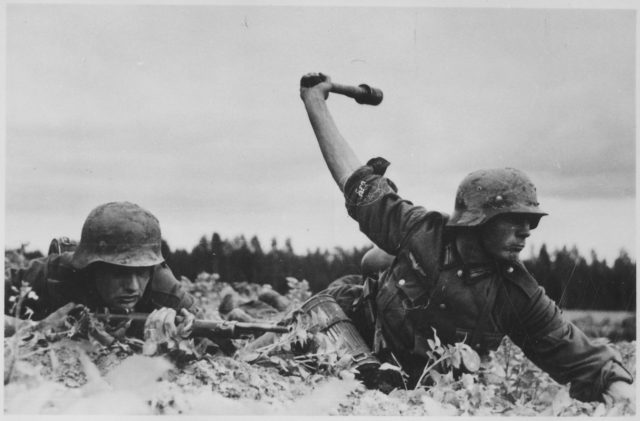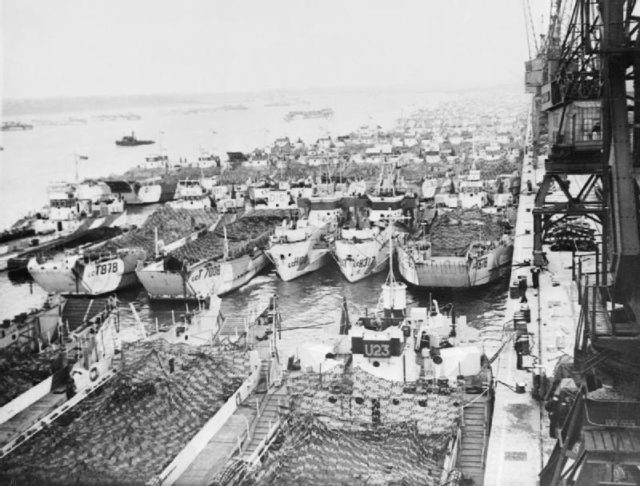As Fuhrer of the Third Reich, Adolf Hitler was Nazi Germany’s supreme military and political commander. Unfortunately, he could also be obstinate to the point of delusional.
Invading Russia
The most infamous example of Hitler’s capacity for self-delusion was Operation Barbarossa, the invasion of Russia. On June 22, 1941, Germany abandoned the treaty that had brought peace between those powerful neighbors and launched a massive attack along a 1,900-mile front.
Hitler’s invasion of Russia was grounded in the principle upon which he had taken power. He believed Germany needed more space in which to expand so her superior people could reproduce and cover the world. He also believed Communism was a menace to be eradicated. Invading the vast expanses of a Communist country furthered those goals.
It completely ignored strategic reality. In the west, Britain was opposing German aggression. While there was no ground war in Western Europe, there was resistance. Also, Germany and Britain were fighting in North Africa and the skies. Launching a second front meant dividing attention and resources before the problem of Britain was resolved.
Invading Russia was a colossal undertaking. The German army was certainly more sophisticated, but the Russians had far greater resources and manpower to draw on. The Russian winter had famously defeated Napoleon, as it would once again assist in beating the invaders.

Concern about the invasion was expressed by General Heinz Guderian, one of the few men who could argue with Hitler. He pointed out the lack of winter equipment for their troops, the unrealistic timescale for the plan, and that the Russians probably had more tanks than the Germans assumed.
Hitler ignored Guderian’s advice. He continued to ignore it as he repeatedly changed plans and his army was forced back out of Russia.
Defending Italy
In 1943, with the war still raging in Russia, Hitler faced another difficulty. The Allies, having pushed the Germans out of Africa, invaded Italy. The Italians threw out Mussolini and switched sides, leaving German forces and Italian sympathizers fighting a bitter retreat up the peninsula.
As in North Africa, Hitler showed the stubbornness that afflicted his command style. Two of his Generals, Kesselring and Rommel, offered him different options. Kesselring wanted to make a stand across the center of Italy. Rommel argued for retreating north and using the mountains as a defensive line. The Alps would provide much better defenses, leaving more troops free to fight in Russia.
After initial indecision, Hitler sided with Kesselring. He did not want to accept the limits of what he could achieve and so tried to beat the Allies on both fronts. It was a decision that would cost his forces dearly.
Staying Military Commander
Although a veteran of the First World War, Hitler had no experience or training as a field commander. He believed he knew best in military matters, as in everything else.
His officers tried to disabuse him of that notion. Early in 1944, it fell to Guderian to again express what others were thinking – that Hitler should give the overall command to an experienced military man. It was not the first time Guderian had argued for giving officers with frontline experience more influence. It was futile. Hitler never believed anyone else’s judgment could exceed his own.
The Invasion of Normandy
Operation Overlord, the Allied invasion of France in June 1944, was preceded by a thorough campaign of misinformation. Using radio signals, double agents, and an entire fake army, the Allies convinced Hitler they were planning to invade the Pas de Calais. Hitler was easily duped because it matched his expectations.
Even after the Allies landed in Normandy, Hitler continued in his previous opinion. For weeks, he held back troops in the Pas de Calais, sure that the First US Army Group under General Patton would invade there.

Meanwhile, Patton had left his fictional army behind, assembled a new group, and exploited an Allied breakthrough to race across France.
By the time Hitler allowed himself to consider any other option, it was far too late.
The Battle of the Bulge
On December 16, 1944, Hitler launched his last substantial effort to halt the Allied advance. 1,400 tanks burst through the Ardennes forest, exploiting a weak point in the Allied lines. Specialists under Otto Skorzeny paved the way by disguising themselves as Allied troops in the hope of causing chaos in their lines.
It was a plan built on wishful thinking rather than reality. The initial attack caught the Allies by surprise, causing a day of confusion and hasty rearrangement of troops. Skorzeny’s men were identified, causing much less trouble than they had hoped. The weather cleared, allowing the Allies to use their domination of the air. Without enough fuel, the German tank-offensive stalled. Within three days, the Battle of the Bulge had halted. The Germans had spent their last spare reserves and gained nothing from it.
The Final Days
The final days of the Nazi empire showed the depths of Hitler’s capacity for self-delusion. Children and old men were mobilized in a desperate attempt to fill the hollow shell of the German army. As the Allies invaded from both east and west, Hitler refused to surrender, believing he could hold out. He declined to listen to the advice of his commanders, who one by one deserted him. Guderian, always the voice of reason, was sent away for again arguing with Hitler.
It was only in his final moments that Hitler faced reality. Amid the ruins of the nation wrecked by his unwillingness to face reality, he killed himself rather than face the consequences.
Sources:
Ralph Bennett (1999), Behind the Battle: Intelligence in the War with Germany 1939-1945
Nigel Cawthorne (2004), Turning the Tide: Decisive Battles of the Second World War
David Rooney (1999), Military Mavericks: Extraordinary Men of Battle
